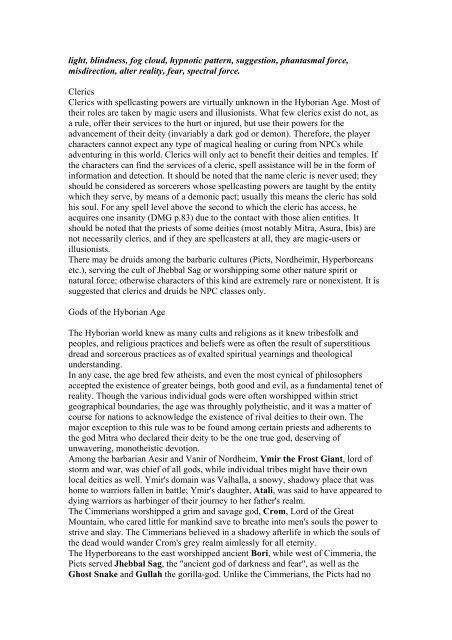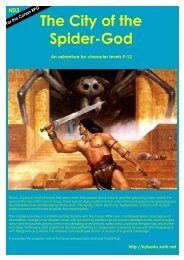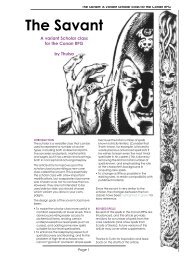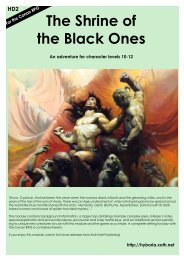AD&D Rules in Hyboria - Hyborian Age
AD&D Rules in Hyboria - Hyborian Age
AD&D Rules in Hyboria - Hyborian Age
You also want an ePaper? Increase the reach of your titles
YUMPU automatically turns print PDFs into web optimized ePapers that Google loves.
light, bl<strong>in</strong>dness, fog cloud, hypnotic pattern, suggestion, phantasmal force,<br />
misdirection, alter reality, fear, spectral force.<br />
Clerics<br />
Clerics with spellcast<strong>in</strong>g powers are virtually unknown <strong>in</strong> the <strong>Hyboria</strong>n <strong>Age</strong>. Most of<br />
their roles are taken by magic users and illusionists. What few clerics exist do not, as<br />
a rule, offer their services to the hurt or <strong>in</strong>jured, but use their powers for the<br />
advancement of their deity (<strong>in</strong>variably a dark god or demon). Therefore, the player<br />
characters cannot expect any type of magical heal<strong>in</strong>g or cur<strong>in</strong>g from NPCs while<br />
adventur<strong>in</strong>g <strong>in</strong> this world. Clerics will only act to benefit their deities and temples. If<br />
the characters can f<strong>in</strong>d the services of a cleric, spell assistance will be <strong>in</strong> the form of<br />
<strong>in</strong>formation and detection. It should be noted that the name cleric is never used; they<br />
should be considered as sorcerers whose spellcast<strong>in</strong>g powers are taught by the entity<br />
which they serve, by means of a demonic pact; usually this means the cleric has sold<br />
his soul. For any spell level above the second to which the cleric has access, he<br />
acquires one <strong>in</strong>sanity (DMG p.83) due to the contact with those alien entities. It<br />
should be noted that the priests of some deities (most notably Mitra, Asura, Ibis) are<br />
not necessarily clerics, and if they are spellcasters at all, they are magic-users or<br />
illusionists.<br />
There may be druids among the barbaric cultures (Picts, Nordheimir, Hyperboreans<br />
etc.), serv<strong>in</strong>g the cult of Jhebbal Sag or worshipp<strong>in</strong>g some other nature spirit or<br />
natural force; otherwise characters of this k<strong>in</strong>d are extremely rare or nonexistent. It is<br />
suggested that clerics and druids be NPC classes only.<br />
Gods of the <strong>Hyboria</strong>n <strong>Age</strong><br />
The <strong>Hyboria</strong>n world knew as many cults and religions as it knew tribesfolk and<br />
peoples, and religious practices and beliefs were as often the result of superstitious<br />
dread and sorcerous practices as of exalted spiritual yearn<strong>in</strong>gs and theological<br />
understand<strong>in</strong>g.<br />
In any case, the age bred few atheists, and even the most cynical of philosophers<br />
accepted the existence of greater be<strong>in</strong>gs, both good and evil, as a fundamental tenet of<br />
reality. Though the various <strong>in</strong>dividual gods were often worshipped with<strong>in</strong> strict<br />
geographical boundaries, the age was throughly polytheistic, and it was a matter of<br />
course for nations to acknowledge the existence of rival deities to their own. The<br />
major exception to this rule was to be found among certa<strong>in</strong> priests and adherents to<br />
the god Mitra who declared their deity to be the one true god, deserv<strong>in</strong>g of<br />
unwaver<strong>in</strong>g, monotheistic devotion.<br />
Among the barbarian Aesir and Vanir of Nordheim, Ymir the Frost Giant, lord of<br />
storm and war, was chief of all gods, while <strong>in</strong>dividual tribes might have their own<br />
local deities as well. Ymir's doma<strong>in</strong> was Valhalla, a snowy, shadowy place that was<br />
home to warriors fallen <strong>in</strong> battle; Ymir's daughter, Atali, was said to have appeared to<br />
dy<strong>in</strong>g warriors as harb<strong>in</strong>ger of their journey to her father's realm.<br />
The Cimmerians worshipped a grim and savage god, Crom, Lord of the Great<br />
Mounta<strong>in</strong>, who cared little for mank<strong>in</strong>d save to breathe <strong>in</strong>to men's souls the power to<br />
strive and slay. The Cimmerians believed <strong>in</strong> a shadowy afterlife <strong>in</strong> which the souls of<br />
the dead would wander Crom's grey realm aimlessly for all eternity.<br />
The Hyperboreans to the east worshipped ancient Bori, while west of Cimmeria, the<br />
Picts served Jhebbal Sag, the "ancient god of darkness and fear", as well as the<br />
Ghost Snake and Gullah the gorilla-god. Unlike the Cimmerians, the Picts had no





